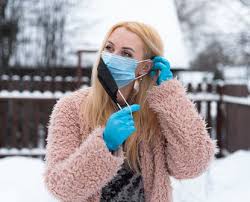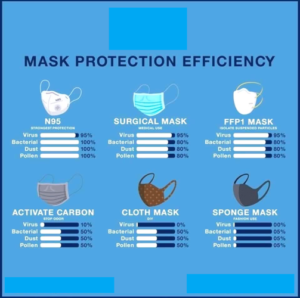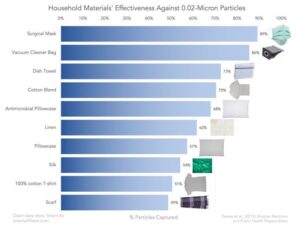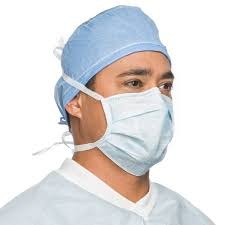Why Fabric Masks?
- Strictly speaking, neither of N95 Respirators, N99 Respirators , N100 Respirators, Disposable Surgical Masks nor Disposable Face masks can 100% protect against Covid-19 penetration
- When buying, ask for N95 Respirators, N99 Respirators, N100 Respirators, Disposable Surgical Masks or Disposable Face Masks certification
- Fabric Masks ought to be given consideration in view of current shortage of Disposable Masks, and unnecessary wastage and excessive expenditure, as well as impact on environment through the disposal of Disposable masks
- Not all Fabric Masks are the same, and there are 3 ways to test for good quality Face Masks
- Fabric Masks offer notable significant cost savings
- There has been much imprecise information made about Fabric Masks,which ought to be corrected
- There is growing validation for the use of Fabric Masks, by for instance the World Health Organisation (WHO), USA authorities, Malaysian authorities, Japanese government, and Singaporean government
Why Fabric Masks?
There has been a lot of discussion and debate of late, arising from the Covid-19 Pandemic, as to the types of respiratory masks which ought to be used
Given the preceding, a detailed investigation into this matter is most necessary
Types of Masks
First and foremost, it should be noted that there are, generally speaking, 3 generic types of mask which are presently in use (with in-between hybrids):
1. Disposable N95 Respirators

2. Disposable Surgical Masks and Disposable Face Masks

Disposable Surgical Masks

Disposable Face Masks
3. Reusable Fabric Face Masks

Reusable Fabric Face Masks
Masks Primer
Before we continue further, allow us to share some mask basics:
1. Firstly, The NIOSH (The National Institute for Occupational Safety and Health, a United States of America federal agency) defines a (Disposable) N95 Respirator as “a respiratory protective device designed to achieve a very close facial fit (note: “very close facial fit”) and very efficient filtration of airborne particles (note: airborne), which blocks at least 95 percent of very small (0.3 micron) test particles (note: 0.3 micron)”
+ it is also noted that whilst there are also such better qualities as N99 Respirators and N100 Respirators, the N100 Respirators can only filter up to 99.97% of airborne particles (note: 99.97%, not 100.00%)
+ given that the size of Covid-19 virus is between 0.06 micron to 0.14 micron (note: 0.06 micron to 0.14 micron), hence, strictly speaking, neither of N95 Respirators, N99 Respirators nor N100 Respirators can 100% protect against Covid-19 penetration
+ in fairness to N95 Respirators, given that Covid-19 travel by way of droplets (typically of 1.0+/- micron in size) and also by way of being airborne, N95 Respirators can filter droplet Covid-19, but perhaps less so of airborne Covid-19

Covid-19: 0.06 micron to 0.14 micron
2. Secondly, depending on the type of fabric qualities used in Disposable Surgical Masks or Disposable Face Masks, such disposable masks similarly cannot guarantee against Covid-19 infection
+ amongst the best in class, such as the ASTM F2100-11 Level 3 quality Surgical Masks, protection can only be offered to at least 98% filtration of 0.1 micron particles
– hence, similarly, ASTM Level 3 Surgical Masks cannot offer 100% protection against Covid-19 of 0.06 micron to 0.14 micron in size

+ another often overlooked deficiency of Disposable Surgical Masks or Disposable Face Masks are the gaps found between the mask and nose, back of cheek and chin, which offer opportunities for viral penetration
– thus, even if one were to wear a 100% filtration fabric (which does not for now exist yet), such leakages effectively reduces the effectiveness of the said masks
– therefore, again, it can be said that Disposable Surgical Masks or Disposable Face Masks similarly do not offer 100% protection against Covid-19 penetration

gaps found between the mask and nose, back of cheek … rendering this Disposable Face Mask lesser in effectiveness
+ based on the preceding, it is underscored that it is not suggested that N95 Respirators and Disposable Surgical Masks or Disposable Face Masks are of no or minimal significance
– as noted, N95 Respirators and ASTM Level 3 Disposable Surgical Masks are the best protection devices so far, with N95 Respirators essentially used in such high risk circumstances as current Covid-19 treatment purposes, whereas Disposable Surgical Masks are used in surgeries and similar risk instances
– thus leaving Reusable Fabric Masks for general safety and community purposes, as well as not high risk instances, which includes for the prevention of spread of viruses by those who have already been infected but not yet shown symptoms, ie by asymptomatic people
+ a further equally serious oversight is where buyers do not ask for Disposable Surgical Masks or Disposable Face Masks certification
– certifications by relevant testing agencies according to appropriate standards are most important to ensure that the Disposable Masks purchased are useful, or actually, produced in accordance with relevant tested and accepted standards
– for instance, if the best in class Surgical Masks are preferred, then buyers ought to request for sighting of ASTM F2100-11 Level 3 certification
– by right, the certification ought to be issued to the name of relevant manufacturer, and perhaps for simplicity, the least that can be done is to require the seller or distributor to show evidence of agency, distributorship or legitimate representation
– given the current immense global demand, there are many manufacturers joining the foray, sometimes to the extent of manufacturing Disposable Masks which do not meet any standards, or may not be certified, if at all
– in two instances which we had encountered, one manufacturer explained that they were too busy to share one, and another later said that certification is not required for their type of product
– therefore, again, a good number of people would assume that the purchase of Disposable Surgical Masks or Disposable Face Masks should be sufficient, when in fact, there ought to be more incisive due diligence, especially when one is very particular about the effectiveness of the Disposable Masks
Putting a Case for Fabric Masks
Of course, it cannot be denied that the Disposable N95 Respirators, Disposable Surgical Masks or Disposable Face Masks are still, for now, the most effective protective devices
Given the preceding, and given the continuing shortage of such Personal Protective Equipments (PPEs) such as Disposable N95 Respirators, Disposable Surgical Masks or Disposable Face Masks, it is submitted serious consideration ought to be given to such alternative devices as the Fabric Masks
Much has been said and questioned about the effectiveness of Fabric Masks, but Fabric Masks must not be dismissed without considering the following:
+ shortage of Disposable N95 Respirators, Disposable Surgical Masks or Disposable Face Masks, where such shortage of supply can be mitigated by the public using Fabric Masks, such that the Disposable N95 Respirators, Disposable Surgical Masks or Disposable Face Masks can be reserved for healthcare frontliners
+ unnecessary wastage and excessive expenditure in the use of Disposable N95 Respirators, Disposable Surgical Masks or Disposable Face Masks, where it is much cheaper to use Fabric Masks
+ consider also the impact on the environment through the disposal of such immense quantities of Disposable Masks
+ relevant fabric qualities used to produce Fabric Masks
Put another way, Fabric Masks of good quality ought to be given consideration as it will help ease the Disposables shortage for healthcare frontliners, and help achieve cost savings for those who do not really need to use the Disposables
Fabric Masks Notable Significant Cost Savings
Fabric Masks are certainly much cheaper over the long-term, because they are washable and reusable
A piece of Disposable Surgical Mask or Disposable Face Mask currently costs RM 1.00/pc
+ if this were to be used over a period of 30 days for an organisation of 100 people, it would come up to RM 3,000.00
– and assuming that you have to wear the Disposable Masks over a period of 3 to 6 months, this will come up to RM 9,000.00 to RM 18,000.00
In comparison, Fabric Masks would cost only, depending on the type, say RM 13.90/pc
+ hence, the cost of Fabric Masks would only come up to RM 1,390.00
– and these Fabric Masks can be used easily over a period of 6 to 12 month
Based on cost alone, Fabric Masks are certainly justifiable
Fabric Masks Safety
In terms of Fabric Masks safety, it will depend on the type of fabrics used in making the Fabric Masks
So, how would you know which are effective and which are not?
+ firstly, you can try the Window Test
– hold up the Fabric Mask against light at the window, and if you can see light coming through, then you can conclude that the fabric will likely not be effective
– as noted, the size of the virus is between 0.06 micron to 0,14 micron
– compare this against the diameter of hair, usually taken at 75 microns (actually, the diameter is between 17 to 181 microns), so effectively there can be 535 to 1,250 viruses across the diameter of a 75 microns hair
– so, if you can see light coming through the fabric when you hold it up against the light at the window, this means that viruses can easily pass through
– therefore, it is recommended that relevant Fabric Mas be not used
+ secondly, check per the Stretch Test, ie if the fabric is stretchable
– if the fabric is rather stretchable, it would mean that when you wear and stretch the Fabric Mask, the pin-hole or hair diameter size holes of the fabric will be further stretched, thereby increasing the risks of viruses passing through
– to be safe, best not to use stretchable fabrics
+ thirdly, consider the GSM Test, ie ask about the weight of the fabrics used in the Fabric Masks
– typically, disposable facemasks or disposable surgical masks are between 40gsm (1-ply) to 100gsm (3-ply) in weight (gsm means grams per square metre)
– (just to compare, A4 paper is generally between 70gsm to 80gsm in weight)
– if the Fabric Mask uses thick fabrics, say of 300gsm, then you can be assured that the fabric is pretty compact, and is also easily as safe as 3-ply Disposable Masks
Current Misinformation about Fabric Masks
There has been a lot of commentaries shared in respect of Fabric Masks, especially in respect of the ineffectiveness of Fabric Masks, which whilst relevant experts have cast doubts on the efficacy of Fabric Masks, there has been no visible or pervalent admission that even the N95 Respirators, N99 Respirators, N100 Respirators, Disposable Surgical Masks or Disposable Face Masks do not guarantee against the penetration of Covid-19 of 0.06 micron to 0.14 micron (as such protective devices have only been tested to 0.10 micron)
In a 2013 research undertaken by researchers at the Cambridge University, it has been concluded, amongst many other conclusions, that cotton blend fabrics can capture 70% of 0.02 micron virus particles

Infographics such as the one below does not do justice to anything, by offering over-generalised conclusions, and without backing conclusions with research nor specificity:

For instance, if you would look at the above infographic, how would it be possible to claim that N95 Respirators offer protection against 95% of viruses, when there is no reference to the currently relevant Covid-19 of 0.06 micron to 0.14 micron, and whereas N95 Respirators can only offer protection in respect of particles of at least 0.10 micron?
By the same token, how would it be possible to claim that Cloth Mask, or Fabric Mask, does not offer any protection at all, or offers 0% protection against viruses, when there are so many types of fabrics available for use, and certainly not all fabrics are incapable of offering protection?
+ the Cambridge University as cited above certainly invalidates this incorrect claim
Growing Global Validation
if the preceding sharing is not yet deemed sufficient, consider the following:
+ the World Health Organization (WHO) has reversed its position by now recommending the use of Fabric Masks
+ similarly, US authorities have also reversed its position and have recommended Americans to wear Fabric Masks
+ the Malaysian Ministry of Health has also recently recommended to the Malaysian public to wear Fabric Masks as additional protection, and also so as to reserve Disposable Masks for frontlines
+ the Japanese Government has started to distribute 2 pieces of Fabric Masks per household to its over 50,000,000 households
+ the Singapore Government has distributed millions of pieces of Fabric Masks to its citizens
Our Conviction as Responsible Fabric Technologists
As a responsible company, we are committed towards ensuring that our SafeMask Fabric Masks are of utility and will offer the required level of basic safety
+ at the time of writing, relevant fabrics of performance and with certification are being arranged for importation such that our next generation of SafeMask Fabric Masks will offer even better safety and protection
The current Covid-19 Pandemic is certainly unprecedented, and we will do our bit and our best to extend our expertise to assist




